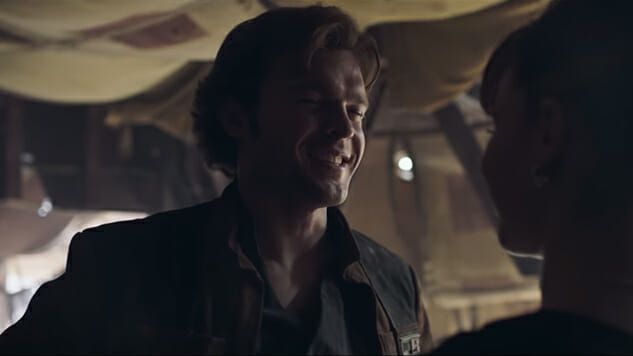Solo: A Star Wars Story

Ron Howard should not have directed this Star Wars Story. A rollicking mix-em-up of heist flick, war film, western and Indiana Jones-style adventure (in this case: Temple of Doom), Solo handsomely runs our titular hero (portrayed believably enough by Alden Ehrenreich) through one episode of fan service after another, setting up big action set pieces to make sure that everything you know about Han Solo from Episodes 4-6 finds its genesis here. Han gives himself a last name, meets Chewbacca (Joonas Suotamo), is gifted the blaster that he’d later use to murder Greedo in cold blood, meets Lando Calrissian (Donald Glover), wins the Millennium Falcon from Lando, makes the Kessel Run in less (give or take) than 12 parsecs, first crosses paths with the burgeoning rebellion and ultimately sets out to meet Jabba the Hutt on Tatooine, all within the course of what probably amounts to a couple days. It’s pretty graceless—and borderline nonsensical—if you think about it too hard, as if screenwriters Lawrence Kasdan and son Jonathan were bloodlessly ticking off boxes on their contracts, remembering every once in a while to have Han refer to an accomplice as “buddy.” Han calls everyone buddy.
What more should we expect? A new entry in Star Wars canon is too much of a spectacle to cover anything less than the cornerstones of these characters we’ve grown to love, and Solo accordingly matches its scale to the expectations of such a franchise event. Which is perhaps where Chris Miller and Phil Lord may have strayed from studio mandate, leading to them ultimately leaving the film: Ron Howard can handle big films, can toe the line, while Lord and Miller may have been aiming at something too entirely different, too open to improvisation and character intimacy, to give Kathleen Kennedy and co. (probably including the Kasdans, whose script is workmanlike at best) what they wanted. Which is of course speculation, but Solo’s sense of scale, while impressive, seems to dominate all other aspects of the film. A relatively small, scrappy, self-contained story about Han Solo in the years before meeting Luke Skywalker has no place in Disney’s new canon.
Howard covers a lot of ground with the kind of hyper-efficiency we can expect from a visual storyteller with his experience. Han—whose age is indeterminate, supposedly anywhere between 16 and 27, which doesn’t do anyone any favors as far as offering a semblance of context—lives in indentured servitude on the planet of Corellia, which is, like all Star Wars planets, seemingly made up entirely of one city or environment, in this case interchangeable industrial dystopia. Galactic power constantly shifting between crime syndicates, the Empire has risen to exploit the decentralized factions and consolidate its influence—meaning Solo must take place after Revenge of the Sith but before Rogue One? The film never clarifies, which is strange given that it struggles so hard throughout the rest of the film to time Han’s journey within a very specific place in Star Wars lore, the result being the sense that Solo is both trying too much and not enough.
In a daring attempt to escape his crap life alongside his girlfriend and fellow urchin Q’ira (Emilia Clarke), Han makes it past Imperial border security, but Q’ira isn’t so lucky. Vowing to return to Corellia one day to save her, Han joins the Imperial army under the assumption that he can both hide and earn a ship he can use to then desert the Empire. Two years later, still a grunt in the neverending war strangling the galaxy, Han meets Beckett (Woody Harrelson), Val (Thandie Newton) and Rio Durant (voiced by Jon Favreau), the four-armed Ardennian who gives Han the boost of confidence he needs to pursue his dream of being the best pilot ever. Not that Han needs a boost in confidence: Much of his adventures simply seem to occur, Han ably lucking his way through every danger, conveniently knowing the Wookiee language when he needs to, or having impressive aim with a blaster because that’s what the situation demands. Which would be welcome were the tone of the film not so at odds with itself, Bradford Young’s stunning cinematography, washed out and grimly stark, befitting a much bleaker film, while the maverick cad Han Solo, as chuckled together by Ehrenreich, appears to be swaggering through something so much looser.
-

-

-

-

-

-

-

-

-

-

-

-

-

-

-

-

-

-

-

-

-

-

-

-

-

-

-

-

-

-

-

-

-

-

-

-

-

-

-

-








































